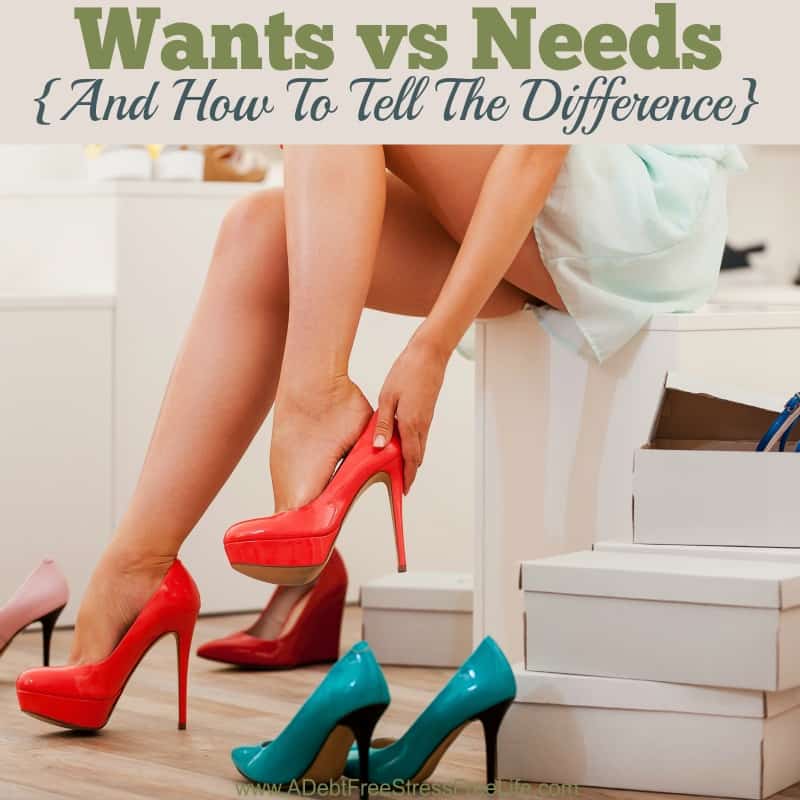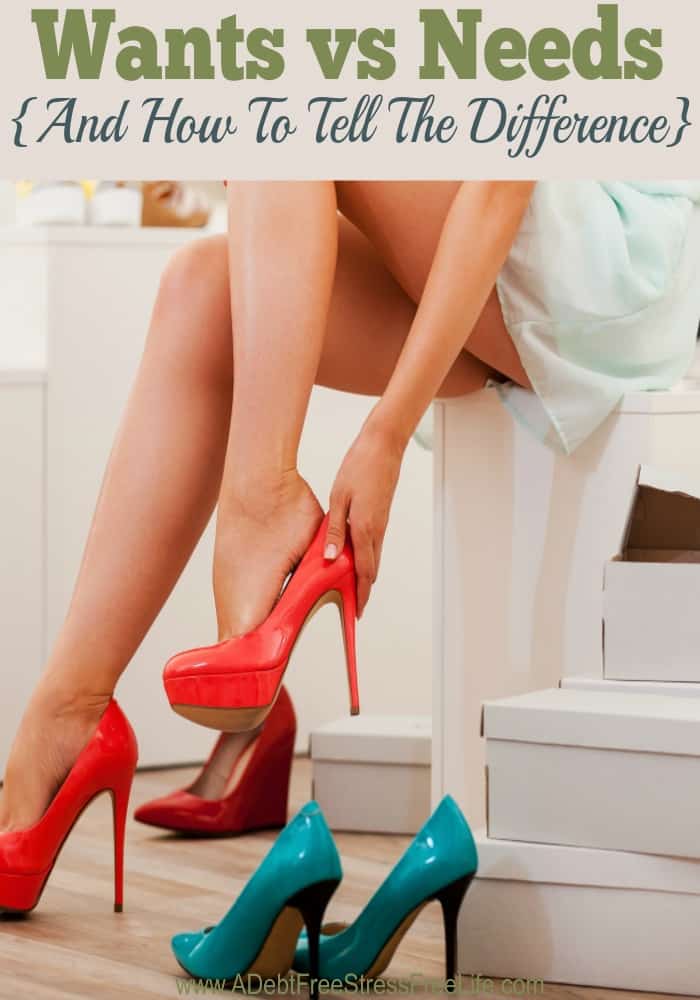A Mess Free Life may collect a share of sales or other compensation from the links on this page.
Wants and needs often get mixed up in our minds when we’re standing there in front of something that’s super appealing to us.
Let’s imagine for a moment that your biggest nemesis to your budget is shoes.
You wander into the shoe department only to see the most fabulous leather boots. You pick them up, caress them gently, imagine them on your feet.
You begin the internal conversation with yourself about wants vs needs as you stare at these boots. It quickly digresses into how much you need them.
Before you know it, you’ve summoned the sales clerk and have those hot boots on your feet quicker than you can say, “thank-you.”
As you leave the store, you reaffirm you need for these fantastic boots.
Table of Contents
How To Tell The Difference Between Your Wants vs Needs
In the early years, I had that type of experience every time I hit the shoe department. Well, truth be told, I had that conversation almost anytime I made a purchase.
I “needed” a lot.
The problem was, what I needed couldn’t be bought.
Maybe you can relate?
Read: How Your Beliefs About Money Can Keep You Stuck {And What To Do About It}
Most people don’t understand the difference between wants and needs. They struggle with making the distinction.
A few years ago I came across this little saying, and it’s helped me to remember the differences when faced with the challenge of determining if what I desperately want to buy is a want or need.
For shopaholics like us, it helped me turn around my shopping addiction and taught me the differences I desperately needed to learn.
Here it is: An easy way to remember the difference between want vs need
A need, when filled sustains you.
A want, when filled will entertain you.
Substituting wants for needs will eventually drain you.
Read: The 30 Day Love Your Money Mindset Challenge
Your deepest needs can’t be met at Macy’s.
Our need for laughter, companionship, physical touch, friendship, and spiritual connectedness to name a few, cannot be satisfied with a shopping spree.
Making a purchase as a substitute for fulfilling a need, may work in the short run, but eventually, the sense of deprivation will rear its ugly head, and the cycle of buying will begin again.
When I think of a want, I immediately think that I will be immediately gratified. If you have the sudden urge to have something immediately, then it probably wants and not a need.
By slowing down, looking inward and discerning if that item is a need or want you’ll be able to reduce vastly the impulse buys that often contribute to money struggles.
Next time you’re out shopping, try this exercise.
Before making the purchase ask yourself these questions:
1. Do I really need this? (The focus here is on the word need)
If I waited a week, a month or a year would I really still need this?
2. Do I really need this? (The focus here is on the word really)
This is about the degree of need. Do I really need this enough that I should make this a priority? Do I need this so much I’m willing to give up something else to have it?
Read: How To Spend Money Wisely
3. Do I really need this? (The focus here is on the word this)
You’re attempting to discern here if this particular item is an attempt to meet a need that is impossible to meet with material things.
Are you feeling lonely, angry, anxious, rejected, or ashamed? Are you trying to mask a deeper feeling with this purchase? If so, how could you get your need met in another way that would fill the need?
If after asking yourself these three questions your answer is still “yes, I need this,” there is one more questions to ask:
4. Is buying this item worth what you’d have to give up to have it?
Asking this question will help you stay connected to your money and the consequences of making that decision. It’s not that you can’t have it. It’s just if you choose to buy it, you’re choosing to forgo or delay spending on something else and maybe something else that’s more important, like paying a bill.
None of us have an endless amount of money. Ultimately the choice is ours whether we put off something more important for this “want.”
Read: Good Money Habits
I ask myself these questions still when to determine wants vs needs when I make a purchase, particularly if I am feeling the compulsion to go out and spend money. Hey, I’m not perfect and sometimes find myself trying to fill a need with shopping.
As emotional issues rise to the surface, I have to stop and check-in with myself to see if it’s a deeper emotional need that isn’t being met and that I am trying to reach them by making a purchase.
Next time you find yourself out shopping, stop and ask yourself these questions.
Remember, it’s about being connected to your money and realizing that understanding your underlying need is an inside job.


